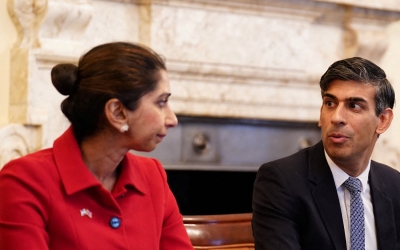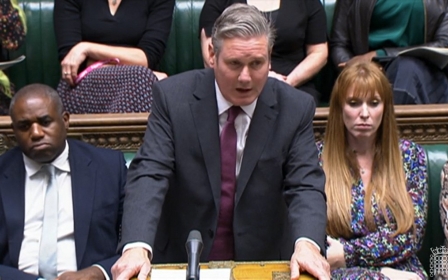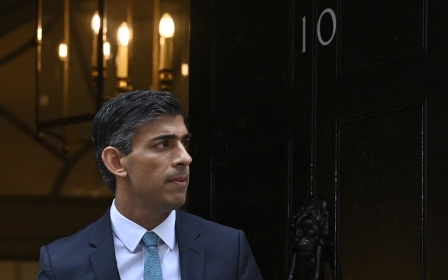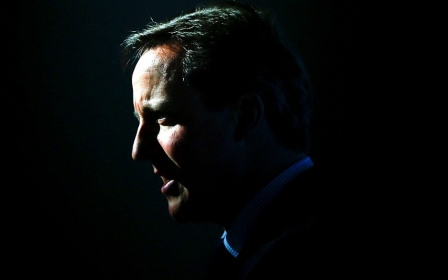UK election 2024: Sunak’s far-right movement is a threat to political stability
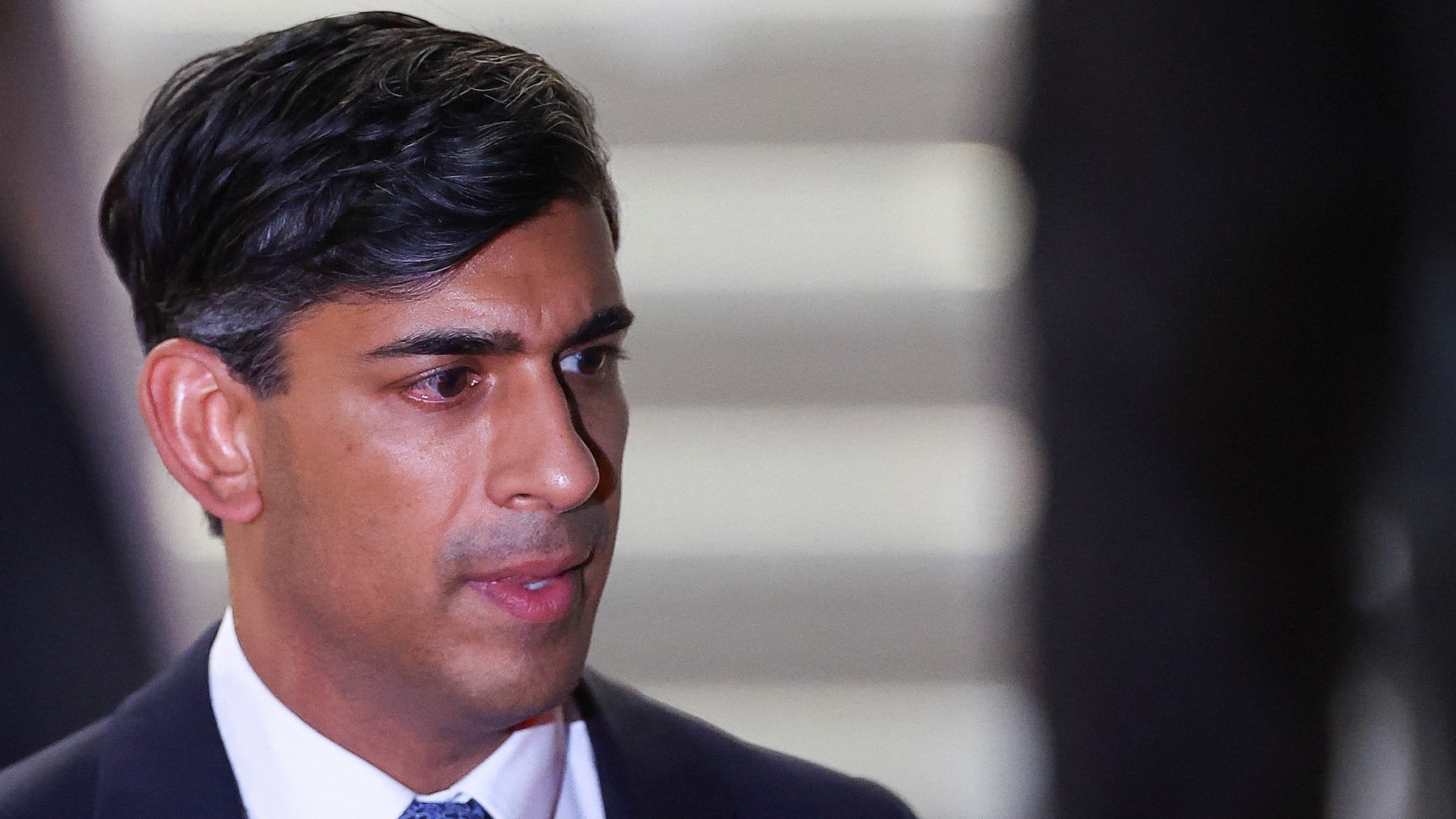
Expect British politics to lurch towards the extreme right in 2024 as Prime Minister Rishi Sunak battles for political survival.
Opinion polls predict Sunak will suffer a landslide defeat at the next general election - which must be held by January 2025 at the latest.
In its fight for survival his Conservative party will resort to ever more desperate measures.
In the absence of any meaningful plan to sort out Britain’s problems, Sunak has already adopted a policy of stimulating hatred and division through the so-called "war on woke". The latest instalments of this cynical tactic have involved a manufactured row with the Greek prime minister over the Elgin marbles, and the illegal plan to deport migrants to Rwanda.
These are all part of a strategy is to create "wedge issues".
In my opinion, this method, associated with the right-wing political adviser Lynton Crosby, is used to create an illusory sense of purpose and activity, while distracting voters from real economic and social problems.
This technique involves targeting minorities, especially Muslims. At the heart of it is an attempt to make immigration the fulcrum issue of the next general election.
Flirting with the far right
This became obvious after Sunak’s massively significant, but mysteriously under-reported, decision to fly to Italy on 13 December to join a political festival in Rome organised by Italian premier Giorgia Meloni’s hardline Brothers of Italy. Previous speakers included Donald Trump’s former adviser Steve Bannon and Hungarian Prime Minister Viktor Orban.
Sunak warned that immigration would "overwhelm" Europe and talked of changes in international law to fight the problem. Sunak’s language thus strayed close to the great replacement theory - an idea already advocated by neo-fascist parties across Europe.
The great replacement theory is a racist, white nationalist conspiracy theory which holds that foreigners are taking over Europe. Sunak's flirtation with far-right European politicians suggests he means to place it at the heart of the Tory election campaign.
In 2024, Sunak’s Tory party will take another giant step towards morphing into a far-right movement with more in common with National Rally in France or the AFD in Germany.
These parties are not Conservative in the British sense of the term. They are extremist insurgent groups driven by xenophobia and nationalism and often contemptuous of institutions, such as parliamentary democracy and the law courts, which bind countries together.
Here is the raw calculation behind Sunak's strategy: current polling shows Keir Starmer’s Labour leading the Conservatives by 20 percent and heading for a massive 459 seats in the Commons, with the Tories collapsing to 120 seats. This would be a bigger landslide than Tony Blair’s famous victory in 1997.
However, Conservative strategists have discerned one ray of hope.
Wedge issues
Nigel Farage’s Reform party stands on eight percent. If those Farage voters can be added to the 24 percent currently planning to vote for Sunak's Conservatives, that takes the Tory vote, if not to victory, at least to the realms of respectability.
Tory strategists are determined to target Farage’s Reform voters. Hence the wedge issues and willingness to toy with racist politics. I doubt it will be enough to win power, especially given Sunak’s dreadful record as prime minister.
He has lacked personality, leadership, a mature understanding of politics, any sense of integrity or understanding of British history.
Foreign leaders, with the conceivable exception of India’s Narendra Modi, do not take him seriously. He has come to symbolise the collapse of British statecraft, a problem made worse by the fact that the country’s most senior civil servant, Cabinet Secretary Simon Case, appears to have taken an indefinite period of leave due to an unspecified health problem.
Sunak has lacked personality, leadership, a mature understanding of politics, any sense of integrity or understanding of British history
Britain is in chaos.
In the event that Labour’s Starmer enters Downing Street as prime minister next year, he will inherit an appalling legacy: a stagnant economy, spiralling public debt, public corruption and incompetence, and worst of all a nation divided by Sunak's rancid politics.
Almost 50 years ago, in February 1974, Labour’s Harold Wilson took over as prime minister from Edward Heath’s Conservatives. Back then, too, the economy was all stagnation and collapse, problems that Wilson would prove unable to solve.
But I fear that the general election of May 1929, which saw Ramsay MacDonald become Labour prime minister after a closely fought election, may provide a closer analogy.
The great depression and mass unemployment lay ahead. MacDonald proved unable to deal with domestic problems, and the Labour government would split over spending cuts two years later.
Abroad the situation was yet more menacing, with the far right on the march across Europe.
MacDonald’s Labour government proved incapable of coping with such dark times, and it was not long before the Conservatives returned to office as the dominant part of a national government, with MacDonald as prime minister in name only.
Starmer’s record as Labour leader has been characterised by indecision and deceit. But Sunak’s far-right Conservative movement now poses a direct threat to British political stability.
We can hope and pray that Starmer offers an alternative.
The views expressed in this article belong to the author and do not necessarily reflect the editorial policy of Middle East Eye.
Middle East Eye propose une couverture et une analyse indépendantes et incomparables du Moyen-Orient, de l’Afrique du Nord et d’autres régions du monde. Pour en savoir plus sur la reprise de ce contenu et les frais qui s’appliquent, veuillez remplir ce formulaire [en anglais]. Pour en savoir plus sur MEE, cliquez ici [en anglais].



